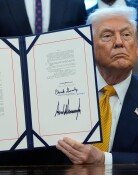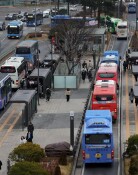Electoral Revolution Blown from Constitutional Court, Where to?
Electoral Revolution Blown from Constitutional Court, Where to?
Posted August. 29, 2001 09:24,
The constitutional court will judge on 30th the unconstitutionality of the provisions on the election law, which allow the current representatives to carry out the election campaign easier than the other candidates, and to regulate the campaigns of the civic organizations for preventing certain candidates from being recommended and being elected.
In case that the constitutional court makes an unconstitutionality decision on these provisions, the large-scale revision of election law will be inevitable with the revision of the distribution method of the proportional representatives and the deposit system, which were determined to be temporary or permanently unconstitutional on 19th last month.
But the verdict on the case of the electorate demarcation standard was excluded from this decision because 9 judges failed to reach an agreement. If the constitutional court finds the unconstitutionality of this case, it will cause most serious impacts and changes. The constitutional court plans to make a decision on this case sooner or later.
▼ Election Campaign Favorable For Current Representatives
Six cases of petition in total were submitted to the constitutional court including the case presented before Rep. Lim Jong-Seok of the New Millennium Democratic Party (NMDP) was elected. The petitioners maintain that the current election law infringes upon the freedom of the political activities and the election campaign, and prevents the able young candidates from advancing to the political world, because it prescribed that while the current representatives can execute the election campaign through the activity report before the official campaign period, other candidates cannot hand out even name card.
▼Provisions Prohibiting Campaign For Rejecting Certain Candidates
Excluding `the statement and expression of intentions to simply support or oppose with regard to the recommendation of candidates by the political party` from `the cases of the prohibited election campaign`, the election law distinguished the campaign of the civic organizations from the one of the general candidates. But that is it. The civic organizations cannot perform the pre-election campaign and further they should receive the same regulations as the candidates during election campaign period.
The Coalition for the General Election asserts that the election law does not distinguish the public voters` campaign from the candidates` campaign so that it has restricted the political participation of people and has violated the political basic rights that the constitutional law guaranteed.
▼Electorate Demarcation Standard
The constitutional court has investigated the case petitioning that the current electorate demarcation system has ignored the equivalency of the votes and the equality of the voters because the population difference between the greatest electorate and the smallest electorate reaches 3.88: 1. In another case that the constitutional has examined, it appealed that the current system encroached upon the voters` right to pursue the happiness by combining Incheon Seo-Gu and Kanghwa-Gun to an electorate district, which was a typical `gerrymandering`.
The constitutional court decided to make a verdict on these cases on 30th and almost agreed on the appealed contents, but the decision was delayed just before the final decision. Some anticipated that the judges have put off the decision considering the serious impacts that the decision will have.
Assessing that the electorate demarcation system, whose greatest population difference was 5.87: 1, was unconstitutional in 1995, the constitutional court offered the standard according to which the population difference should not exceed 4:1. But it is known that some judges offered that the difference should be decreased down to 2:1 in this case. If such a decision is made, 227 electorate districts should be rearranged.
An official of the constitutional court forecasted that ``the decision will be made before the regular session of the National Assembly ends in order not to hinder the revision of election law by the National Assembly.``
Shin Suk-Ho kyle@donga.com







